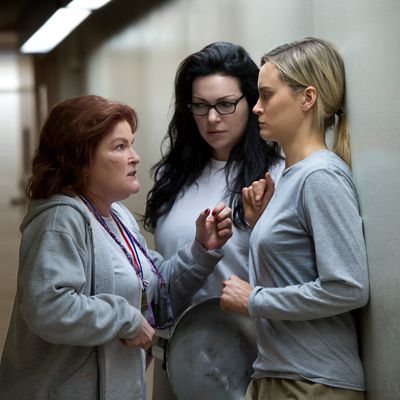
The fifth season of Orange Is the New Black is filled with confounding choices, but the decision to set Piscatella on a one-man rogue revenge plot in “The Tightening” takes the cake for most poorly executed story line. Piscatella has never really worked as a character: He’s too one-dimensional of a villain and too undefined in his motivations. In “The Tightening,” he tries to get back at Red for no discernible reason by rounding up all of her friends in horror-movie fashion.
OITNB seizes the opportunity to dabble in horror-movie tropes, and normally this is something I would enjoy a lot. I love horror movies, and I love horror-movie parodies. Flaca and Maritza become creepy singing twins, Piper and Alex’s sinfully sexy times in the shower take a dark turn, Piscatella’s large frame hovers in corners and breezes past doorways. The music cues and direction all borrow from the horror genre and it’s sufficiently creepy, but also … weirdly played for laughs? A horror-movie parody is completely out of place on OITNB, especially in the context of this current season. What Piscatella is doing is horrifically violent and sadistic, and to tell that story by playing around with genre seems disingenuous at best. Piscatella’s villainy functions as a completely separate force from the rest of the season’s conflict. There isn’t clear motivation, and there’s no clear point. It’s vacuous, voyeuristic torture porn.
The episode ascribes plot significance to Red’s descent into prescription drugs by making her a newly unreliable witness. Nicky doesn’t take her seriously when she says Piscatella could be in the prison, thinking it’s just another side effect of the drugs. Piper and Alex struggle to believe Red, too, at first giving her the benefit of the doubt, but then admitting that her story doesn’t quite add up. The irony of all this is that Red’s story really doesn’t add up: Yes, she’s correct about Piscatella infiltrating the prison and disappearing inmates, but it makes zero sense.
At least Red’s obsession with bringing down Piscatella checks out more than his vendetta against her. As we learn in flashbacks, Red’s determination to push back against oppressive systems has been brewing since her youth. As a young person in Russia, she naïvely believed she could fight the system by wearing Levi’s and selling Western music on the black market. But when her friends start disappearing and her supposedly revolutionary boyfriend immediately fell in line, she realized that fighting the system means more than jeans and music and parties.
Overall, there’s a strong connection between these flashbacks and Red’s arc across the whole series. Sometimes, it’s easy to forget that Red is a prisoner just like the rest, given the considerable amount of freedom she’s often given. But the introduction of Piscatella last season underscores how fleeting her power is. Within Litchfield, she’s fighting for freedom just like everyone else, tapping into her younger self’s desires to fight back. However, the flashbacks don’t add much to the context of the episode at hand. The only real connection between these flashbacks and the immediate present is Red experiencing someone’s disappearance without a trace.
OITNB often demands a certain suspension of disbelief, and I’m usually willing to forgive its over-the-top antics when they lead to moving character moments or otherwise thoughtful messages about the show’s central themes. Piscatella’s rampage does none of that — and it’s especially frustrating since the horror spectacle overshadows the more cogent parts of the episode. We barely spend any time with Figueroa and Taystee, even though their negotiations directly confront the big ideas at the center of the riot. The negotiations end up focusing intently on the lack of a GED program and the MCC-established chain gang, which brings back Litchfield history and grounds the scene in an issue that we’ve seen directly impact the inmates over a stretch of time. It might not have the same kick to it as a flashy horror spree, but it’s drama that is nonetheless more compelling because of clear character motivations and emotional stakes.
Morello and Suzanne’s story line also gets truncated, which unfortunately takes away from its potency. We see Morello go out of her way to avoid taking a pregnancy test, suggesting she’s more aware of her own delusions than people realize. As the prison’s resident doctor, she sets out to deliver meds to Suzanne, who is still chained to a bed and covered in baby powder after Leanne and Angie’s latest act of cruelty. Morello connects with Suzanne over the fact that other people think they’re crazy, and she wants Suzanne to be free … which she interprets as not being on her pills. Suzanne knows this is a bad idea, but she’s swayed by Morello’s talk of freedom.
That’s what everyone in Litchfield is after, isn’t it? Gloria wants the freedom to visit her son, and she’s willing to screw over everyone she knows to get it. Alex wants freedom from her guilt. Red wants freedom from her tormentor and freedom to embrace aging on the outside, where she can learn to paddleboard. Taystee is negotiating for freedom from the oppressive system that killed her best friend. A line is being drawn between those fighting for the good of the many and those fighting for their own self-interests. The clashing of those interests is a more meaningful, thrilling battle than Piscatella rounding up inmates for an incoherent revenge plot with no clear goal. He purports to know how to stop the riot better than the SWAT team called in by the governor, and yet his actions are only escalating the problem. I’m tempted to ask what Piscatella wants, but I ultimately don’t care about the answer, which is telling of how stupid and senseless this story line has become.

